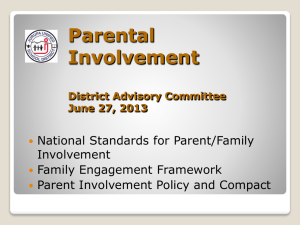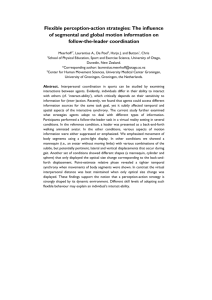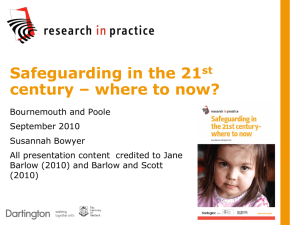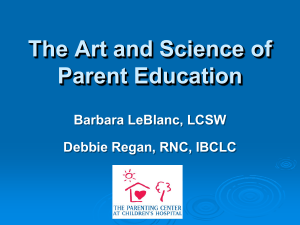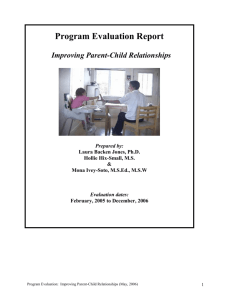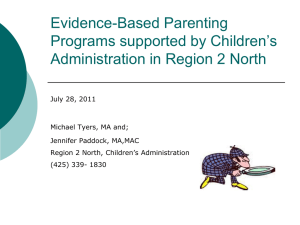Importance of Synchronus Parent
advertisement
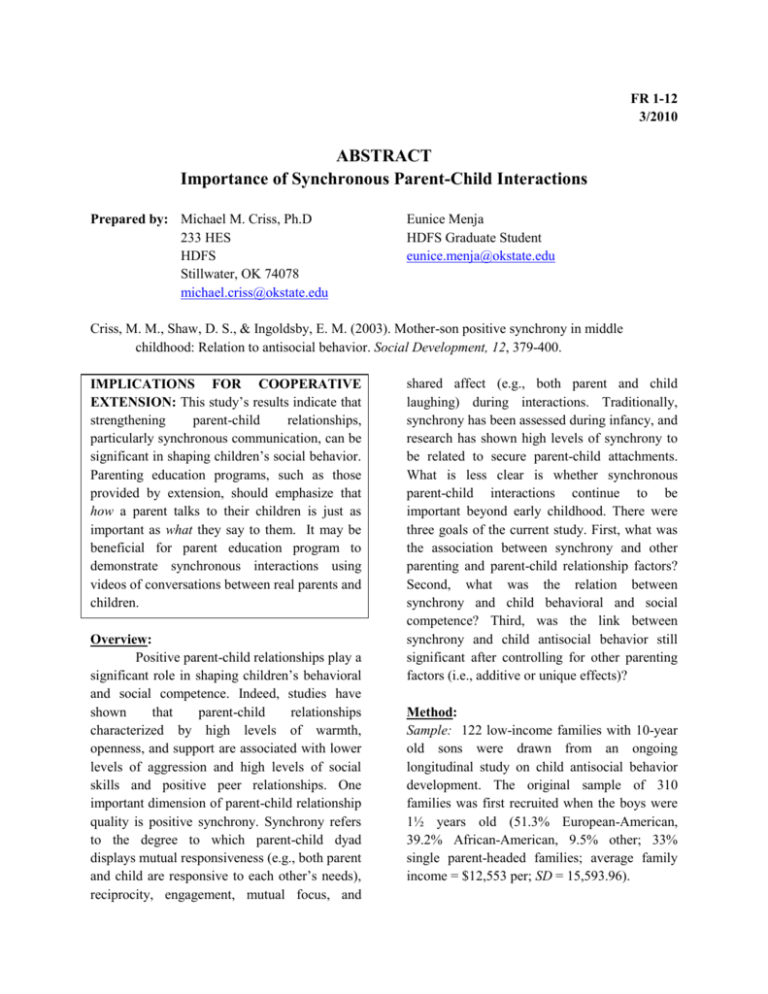
FR 1-12 3/2010 ABSTRACT Importance of Synchronous Parent-Child Interactions Prepared by: Michael M. Criss, Ph.D 233 HES HDFS Stillwater, OK 74078 michael.criss@okstate.edu Eunice Menja HDFS Graduate Student eunice.menja@okstate.edu Criss, M. M., Shaw, D. S., & Ingoldsby, E. M. (2003). Mother-son positive synchrony in middle childhood: Relation to antisocial behavior. Social Development, 12, 379-400. IMPLICATIONS FOR COOPERATIVE EXTENSION: This study’s results indicate that strengthening parent-child relationships, particularly synchronous communication, can be significant in shaping children’s social behavior. Parenting education programs, such as those provided by extension, should emphasize that how a parent talks to their children is just as important as what they say to them. It may be beneficial for parent education program to demonstrate synchronous interactions using videos of conversations between real parents and children. Overview: Positive parent-child relationships play a significant role in shaping children’s behavioral and social competence. Indeed, studies have shown that parent-child relationships characterized by high levels of warmth, openness, and support are associated with lower levels of aggression and high levels of social skills and positive peer relationships. One important dimension of parent-child relationship quality is positive synchrony. Synchrony refers to the degree to which parent-child dyad displays mutual responsiveness (e.g., both parent and child are responsive to each other’s needs), reciprocity, engagement, mutual focus, and shared affect (e.g., both parent and child laughing) during interactions. Traditionally, synchrony has been assessed during infancy, and research has shown high levels of synchrony to be related to secure parent-child attachments. What is less clear is whether synchronous parent-child interactions continue to be important beyond early childhood. There were three goals of the current study. First, what was the association between synchrony and other parenting and parent-child relationship factors? Second, what was the relation between synchrony and child behavioral and social competence? Third, was the link between synchrony and child antisocial behavior still significant after controlling for other parenting factors (i.e., additive or unique effects)? Method: Sample: 122 low-income families with 10-year old sons were drawn from an ongoing longitudinal study on child antisocial behavior development. The original sample of 310 families was first recruited when the boys were 1½ years old (51.3% European-American, 39.2% African-American, 9.5% other; 33% single parent-headed families; average family income = $12,553 per; SD = 15,593.96). Measures: Mother-son synchrony was coded from a conflict resolution interaction task that was videotaped. In addition, mothers and sons provided information on the following factors: openness, conflict, parental monitoring, harsh parenting, child antisocial behavior, child social skills, and peer antisocial behavior. Results: For the first research question, high levels of synchrony were related to high levels of mother-son openness and parental monitoring and low levels of mother-son conflict and harsh parenting. Next, correlation analyses indicated that children who had highly synchronous interactions with their mothers had high levels of social skills and low levels of antisocial behavior and peer antisocial behavior. Finally, the analyses indicated that synchrony remained significantly and uniquely related to child antisocial behavior after controlling for other parenting and parent-child relationship measures. Discussion: The most significant finding in this study was that parent-child positive synchrony was positively associated with children’s social and behavioral competence. Specifically, children from highly synchrony dyads displayed lower levels of antisocial behavior and had fewer deviant friends. It is possible that synchronous parent-child interactions provide children with critical opportunities to learn appropriate interaction skills which can transfer to other relationships and contexts. Indeed, several researchers have argued that the family serves as an important training ground for children that can shape future development. It appears that experiencing synchronous interactions with their children also benefited parents. High levels of synchrony were related to better parenting and closer relationships. It is possible that children from synchronous dyads were more compliant and open to parental discipline strategies. Conversely, the parents from these dyads may have had more favorable views of their children which influenced how they acted toward them. Finally, the findings indicated that synchrony was significantly related to antisocial behavior after statistically controlling for parenting and parent-child relationship quality. These results basically highlight the importance of synchrony in shaping child development above and beyond other critical parenting factors, such as monitoring and harsh discipline. Overall, the findings from this study indicate that synchronous parent-child interactions continue to be important throughout childhood.
